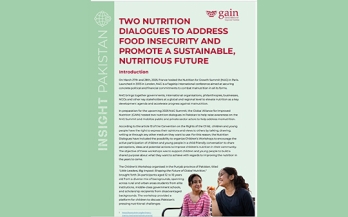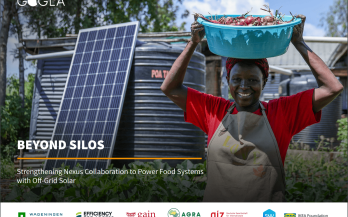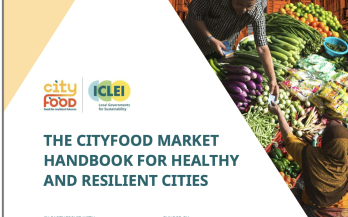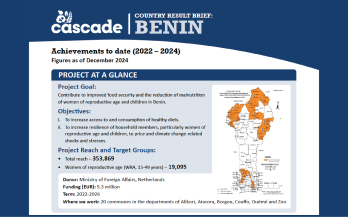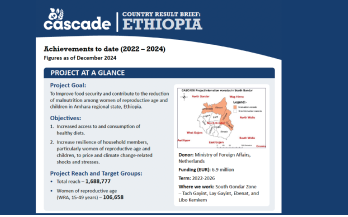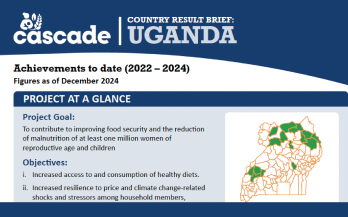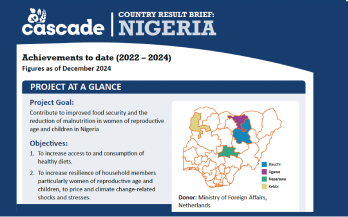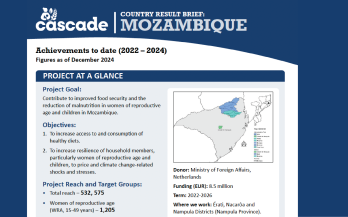- 09/04/2025
On March 27th and 28th, 2025, France hosted the Nutrition for Growth Summit (N4G) in Paris. Launched in 2013 in London, N4G is a flagship international conference aimed at securing concrete political and financial commitments to combat malnutrition in all its forms.
N4G brings together governments, international organisations, philanthropies, businesses, NGOs and other key stakeholders at a global and regional level to elevate nutrition as a key development agenda and accelerate progress against malnutrition. In preparation for the upcoming 2025 N4G Summit, the Global Alliance for Improved Nutrition (GAIN) hosted two nutrition dialogues in Pakistan to help raise awareness on the N4G Summit and mobilize public and private sector actors to help address malnutrition.
- 08/04/2025
This white paper explores the nexus between food systems, infrastructure and energy provided by off-grid solar (OGS) systems.8, 9, 10 The efficiency, sustainability, and productivity of food systems are deeply intertwined with energy use.11 The agricultural sector accounts for 30% of global energy consumption and requires power for food production, storage, transportation and processing. The infrastructure used to power food systems is heavily reliant on fossil fuels, accounting for at least 15% of fossil fuel use globally.12 However, in sub-Saharan Africa, agricultural production consumes significantly less energy than the global average. This limits opportunities for value addition, increases food waste due to inadequate storage and processing facilities, and contributes to low agricultural yields.
- 03/04/2025
Food systems, important for food security, nutrition, prosperity, and environmental well-being, are integral to all 17 Sustainable Development Goals. Traditional food markets are strategic entry points for food systems transformation, since a diversity of stakeholders (including local producers, vendors, consumers, and government), interact routinely in these spaces. These markets connect millions of stakeholders within and across local food systems and levels of government mandates. As food-insecure regions like sub-Saharan Africa (SSA) rapidly urbanise, most urban, low-income, vulnerable communities are reliant on food purchased from markets. As such, markets are key spaces to guide vendor practices, influence consumer food choices, and strengthen inclusive governance. Despite their critical value, markets’ ‘hard’ (structures and equipment) and ‘soft’ (capacities and resources) infrastructure are significantly under-supported. Investment efforts have been challenged by a lack of understanding of how markets are embedded in the wider food system and markets’ wholesale and retail dynamics, inadequate financial models, insufficient public budgets and capacity, and limited empowerment of key stakeholders.
This paper introduces and illustrates GAIN’s Inclusive Food Systems Governance Model and supporting tools. The model is designed to strengthen investment and empower voices, alongside increased efforts to ensure sustainability and resilience in traditional food markets. It has been shown to support effective market infrastructure investments, to foster local agency and inclusive and equitable food systems transformation, and to be adaptable across different contexts. The case of Marikiti Market, Machakos County (Kenya) shows the model in action, including details of specific investment components and costs. As infrastructure investments are limited, the importance of making a sound business investment case for public and private (and philanthropic) partnerships and banks to invest in traditional markets is critical.
- 31/03/2025
As cities around the world grapple with rising food insecurity, climate pressures, and deepening inequalities, food markets play a critical role in building healthier, more equitable, and climate-resilient urban food systems.
- 10/03/2025
Packaging can keep foods safe; help make them appealing, convenient, and long-lasting; and convey key information about them to consumers. At the same time, packaging is an important contributor to food system waste and a major driver of certain foods’ prices in LMICs. As such, it is a sector ripe for creative disruption as part of food system transformation – to ensure safe, nutritious foods can reach the consumers who need them, in affordable forms and with limited negative environmental impact. This paper has considered in detail three packaging innovations that could be used to make nutritious foods more accessible to lower-income consumers: single-serve packaging, reusable packaging, and selling products in bulk without individual packaging.
- 06/03/2025
Project Description CASCADE Benin works to support and strengthen national nutrition policies in 20 communes in six of the country’s 12 departments. Implemented by CARE and GAIN in partnership with nine local organizations, the project aligns with the priorities identified in Benin’s National Food and Nutrition Policy (Politique Nationale de l’Alimentation et de la Nutrition (PNAN).
- 06/03/2025
The CAtalyzing Strengthened policy aCtion for heAlthy Diets and resiliencE (CASCADE) focuses on improving nutrition and food security by promoting healthier diets through multisectoral collaboration and evidencebased food and nutrition-related policies.
- 06/03/2025
Project Description
In Uganda approximately 29% and 53% of children below the age of five years are stunted and anemic, respectively. Additionally, one-third (32%) of women aged 15-49 years are anemic. Access to and consumption of healthy diets remains a challenge for women and children
- 06/03/2025
Project Description
The Catalyzing Strengthened policy Action for Healthy Diets and resiliencE (CASCADE) project champions multi-sectoral nutrition strategies, scaling up actions and complementing the Government of Nigeria’s efforts to strengthen diets as described in the National Food and Nutrition Policy and Multi-sectoral Plan of Action for Food and Nutrition. CASCADE brings Nigeria’s private sector agri-food system actors together with
- 06/03/2025
Project Description
The Catalyzing Strengthened policy Action for Healthy Diets and resiliencE (CASCADE) project is strengthening Mozambique’s food and nutrition security by fostering collaboration among government, the private sector, and communities. CASCADE frames its activities in Mozambique’s national Food and Nutrition Security Strategy 2024-2030 and the National Strategy of Food Fortification 2023-2027. The project focuses on reinforcing government capacity for policy coordination, fostering collaboration between the public and private sectors to strengthen nutrition-related businesses, and empower community-based organizations to advocate for better nutrition and agricultural services. These efforts are complemented by ensuring that nutritional outcomes are considered within agriculture and health interventions. Crosscutting to its work, CASCADE is supporting both policymakers to make evidence-based decisions and stakeholders working across Mozambique’s food and nutrition security landscape.
